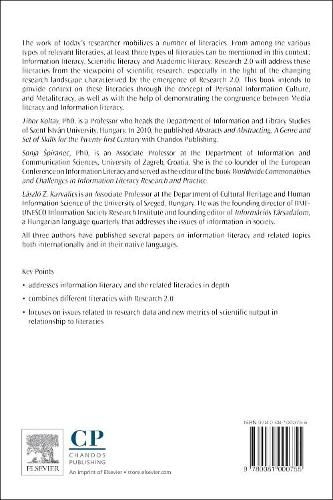Readings Newsletter
Become a Readings Member to make your shopping experience even easier.
Sign in or sign up for free!
You’re not far away from qualifying for FREE standard shipping within Australia
You’ve qualified for FREE standard shipping within Australia
The cart is loading…






Research 2.0 and the Future of Information Literacy examines possible congruencies between information literacy and Research 2.0, because the work of today’s researcher mobilizes a number of literacies. From among the various types of relevant literacies, at least three types of literacies can be mentioned in this relation: information literacy, scientific literacy and academic literacy. This book addresses these literacies in the light of the changing research landscape. Broad contexts of the researcher’s abilities, as adaptive and innovative thinking, problem solving skills, self-management and design mindset are also examined. Computational thinking and the computational paradigm in a number of fields of research are taken into consideration, as well. Researchers differ to non-researchers when populating social media, which means that these two different groups require different literacies. The relationship between information literacy and information is approached in a new way. Among the multitude of issues, we introduce a new interface between information literacy and Research 2.0. It encompasses the issues of research data management and data literacy, which represent also a challenge both for the academic library and for the communities of researchers. Similarly, the questions of new metrics of scientific output are addressed in the book.
$9.00 standard shipping within Australia
FREE standard shipping within Australia for orders over $100.00
Express & International shipping calculated at checkout
Research 2.0 and the Future of Information Literacy examines possible congruencies between information literacy and Research 2.0, because the work of today’s researcher mobilizes a number of literacies. From among the various types of relevant literacies, at least three types of literacies can be mentioned in this relation: information literacy, scientific literacy and academic literacy. This book addresses these literacies in the light of the changing research landscape. Broad contexts of the researcher’s abilities, as adaptive and innovative thinking, problem solving skills, self-management and design mindset are also examined. Computational thinking and the computational paradigm in a number of fields of research are taken into consideration, as well. Researchers differ to non-researchers when populating social media, which means that these two different groups require different literacies. The relationship between information literacy and information is approached in a new way. Among the multitude of issues, we introduce a new interface between information literacy and Research 2.0. It encompasses the issues of research data management and data literacy, which represent also a challenge both for the academic library and for the communities of researchers. Similarly, the questions of new metrics of scientific output are addressed in the book.